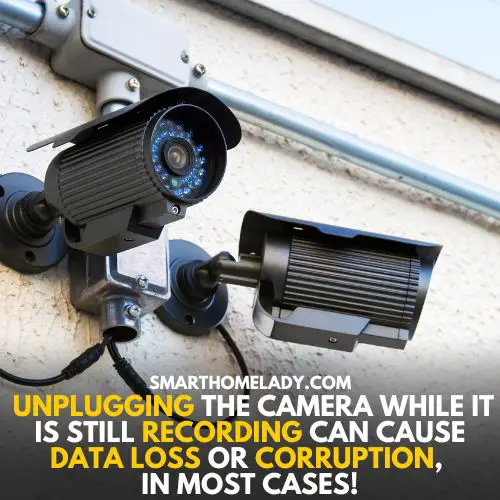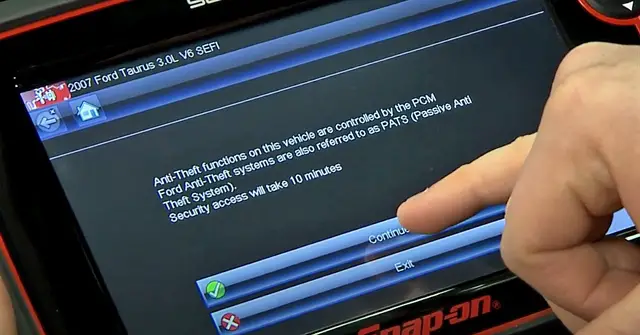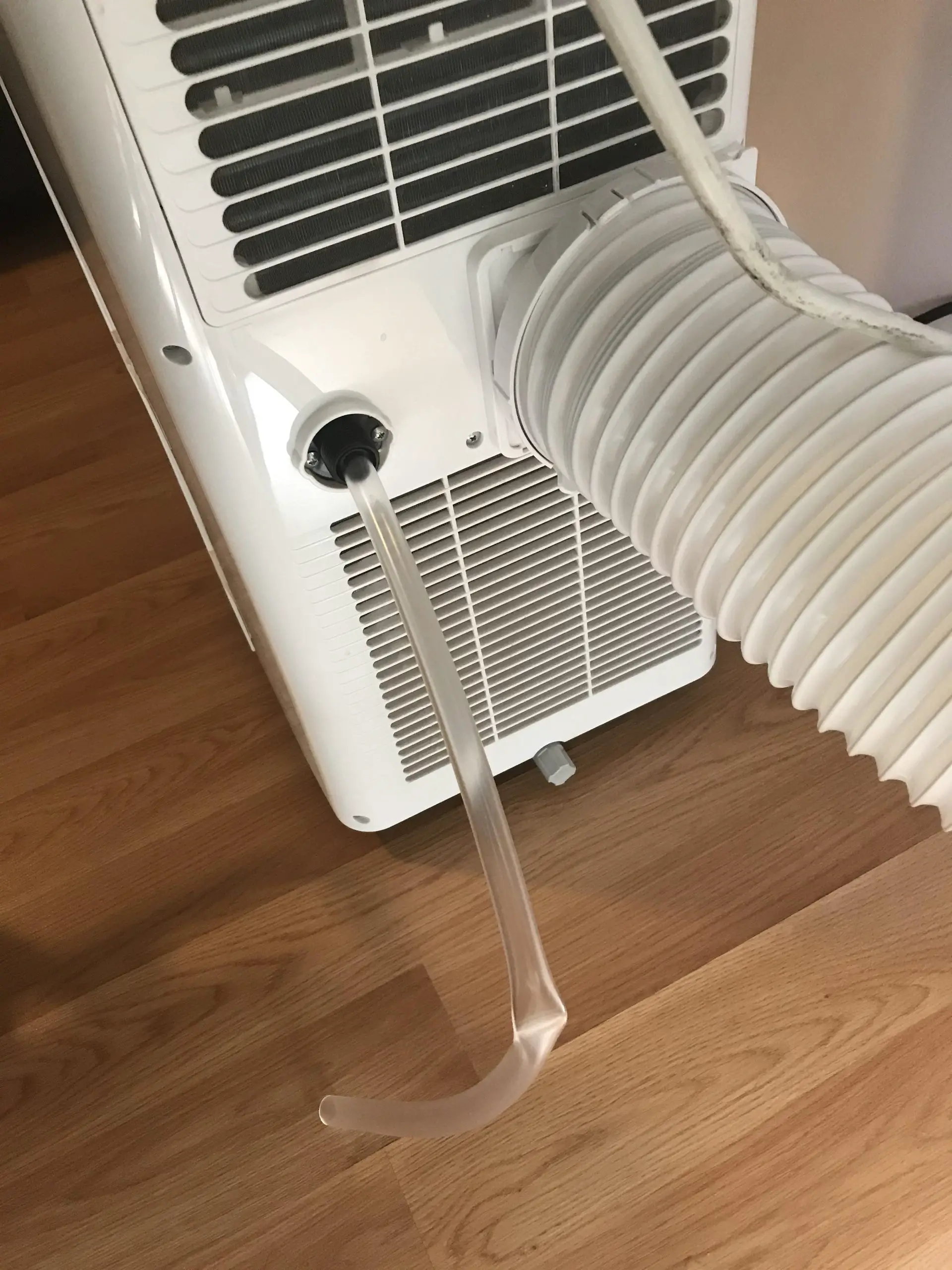Unplugging a security camera will disable its recording and monitoring capabilities. It will not be able to capture any footage or provide surveillance.
Removing the power source from a security camera will render it inactive. Without power, the camera cannot function and will cease to record or transmit any video feed. However, it’s important to note that in some cases, the camera may have a backup power source, so it’s essential to consider additional security measures in place.
Understanding the implications of disconnecting a security camera is crucial for maintaining safety and surveillance.
Table of Contents
ToggleUnplugging Security Cameras: Consequences
Immediate Stop Of Video Capturing
When a security camera is unplugged, the immediate consequence is the cessation of video capturing. This means that the camera will no longer record any footage, leaving the area vulnerable to undocumented activity.
Interruption Of Continuous Monitoring
Unplugging a security camera disrupts the continuous monitoring of the designated area, creating a blind spot in the surveillance system. Without this seamless monitoring, any suspicious or criminal activities may go unnoticed, compromising the overall security of the premises.
Loss Of Potential Evidence
By unplugging a security camera, potential evidence crucial for investigations or resolving incidents may be lost. Any unlawful activity that occurs during the camera’s downtime may remain undocumented, making it more challenging to apprehend perpetrators or validate claims.
Notification To System Administrators
System administrators are notified when a security camera is unplugged, enabling them to take swift action to rectify the situation. This notification ensures that the security system’s integrity is maintained, allowing for timely responses to any security breaches or technical issues.
Security Camera Functionality Disruption
Unplugging a security camera can disrupt its functionality, impacting its ability to record, store data, and detect motion. This can have serious implications for the overall security of a premises. Let’s delve into how security camera functionality can be disrupted when it is unplugged.
Impact On Recording And Data Storage
Unplugging a security camera can lead to a significant disruption in its recording and data storage capabilities. Most modern security cameras continuously record and store footage to ensure that any incidents can be reviewed later. When the camera is unplugged, it immediately stops recording, resulting in a potential loss of critical evidence.
Effect On Motion Detection Feature
Unplugging a security camera also affects its motion detection feature. When the camera is disconnected, it ceases to monitor and detect any movement in its vicinity. This renders the camera unable to alert the user or trigger any alarm systems in the event of unauthorized access or suspicious activity.
Involuntary Reset In Some Camera Systems
In some cases, unplugging a security camera may trigger an involuntary reset in the camera system. This can result in the loss of any configured settings or disruptions to the camera’s normal operation. The unintended reset may require reconfiguring the camera to restore its functionality, leading to potential downtime in the surveillance system.
Safeguarding Camera Footage Integrity
In a high-security environment, safeguarding the integrity of camera footage is paramount. Understanding the implications of unplugging a security camera and implementing measures to preserve existing recordings, ensure data continuity upon reconnection, and establish backup solutions for power outages is essential for maintaining a robust security infrastructure.
Preservation Of Existing Recordings
When a security camera is unplugged, it is crucial to focus on preserving existing recordings to avoid any potential loss of critical footage. Power interruptions can lead to the disruption of ongoing surveillance operations, making it imperative to have contingency measures in place.
Reconnection Procedures For Data Continuity
Upon reconnection, the seamless continuity of data is vital to ensure uninterrupted surveillance. Implementing structured reconnection procedures and verifying the integrity of the footage post-reconnection is essential for maintaining a complete and reliable record of security events.
Backup Solutions For Power Outages
Power outages pose a significant risk to the continuous operation of security cameras. Therefore, establishing robust backup solutions, such as uninterrupted power supply (UPS) systems, can mitigate the impact of power disruptions and safeguard against potential data loss during outages.
When Unplugging Is Intentional
In some scenarios, intentionally unplugging a security camera may be necessary for various reasons. Whether you are conducting maintenance and hardware updates, upgrading your security system, or troubleshooting common issues, understanding the impact of intentionally unplugging a security camera is crucial to maintaining effective surveillance.
Maintenance And Hardware Updates
Regular maintenance and hardware updates are essential to ensure the optimal performance and longevity of security cameras. When unplugging a camera for maintenance or updates, it’s important to follow manufacturer guidelines to prevent any potential risks or malfunctions. This may involve cleaning lenses, inspecting cables, or updating firmware to address security vulnerabilities.
Upgrading Security System
As technology advances, upgrading your security system becomes necessary to keep up with evolving security needs. When replacing or upgrading security cameras, unplugging the existing ones is part of the process. It’s essential to plan the transition carefully to maintain uninterrupted surveillance during the upgrade and ensure the new cameras seamlessly integrate with the existing security infrastructure.
Troubleshooting Common Issues
When security cameras encounter common issues such as connectivity problems, unplugging and re-plugging them may serve as a troubleshooting step. This action can help reset the camera, address software glitches, and restore connectivity. However, it’s important to assess the root cause of the issue before resorting to unplugging, as it may not always be the most effective solution for certain problems.
Communication Break In Security Setup
Unplugging a security camera can lead to a significant communication break within the entire security setup. This can result in various detrimental effects, compromising the overall functionality and reliability of the system.
Effects On Interconnected Alarm Systems
Unplugging a security camera can disrupt the communication with interconnected alarm systems, leading to a potential breakdown in the overall security network. Alarm systems rely on synchronized information from cameras to accurately detect and respond to security threats. When this communication is compromised, the effectiveness of the alarm system may be significantly reduced, leaving vulnerabilities in the security setup.
Compromised Synchronization With Security Apps
Disconnected security cameras can lead to compromised synchronization with security apps, affecting the seamless integration and coordination between the camera feed and security applications. Security apps often rely on real-time data from the cameras for monitoring and alert functions. When the communication is disrupted, the synchronization between the camera and security apps is compromised, impacting the overall effectiveness of the security system.
Disruption Of Remote Access And Control
Unplugging a security camera can lead to a disruption of remote access and control. Remote access allows users to monitor and manage security cameras from anywhere, providing a crucial layer of control and surveillance. When the camera is unplugged, the ability to remotely access and control the device is lost, potentially leaving blind spots in the security coverage and hindering the responsiveness to security incidents.

Credit: www.intheknow.com
Potential Risks Of Camera Downtime
Unplugging a security camera poses several potential risks, particularly in terms of leaving your property vulnerable to security breaches. When a security camera is disconnected, it can lead to a range of issues, impacting the overall safety and protection of the monitored area.
Vulnerability To Theft Or Vandalism
Unplugging a security camera leaves the surveillance area exposed, creating an opportunity for criminal activity such as theft and vandalism. With no monitoring in place, intruders may take advantage of the gap in security, leading to potential financial losses and property damage.
Gaps In Surveillance Coverage
Camera downtime results in gaps in the continuous monitoring of the premises, compromising the ability to capture and record activities that occur in the area under surveillance. This can lead to crucial information being missed, hindering the ability to identify and respond to security incidents effectively.
Challenges In Incident Investigation And Response
Disconnected cameras make it difficult to investigate and respond to security incidents, as there will be limited or no footage available for reviewing incidents or identifying culprits. This can impede the efforts of law enforcement and security personnel in addressing security breaches or criminal activities.
Frequently Asked Questions For What Happens If You Unplug A Security Camera
What Happens If You Unplug A Security Camera?
Unplugging a security camera will cause it to stop recording and transmitting live footage, leaving the area unmonitored and potentially vulnerable to security threats. This action may also trigger a notification or alarm, depending on the camera’s setup. It’s essential to resume power promptly for continued surveillance and protection.
Conclusion
In an effort to enhance security and deter crime, security cameras have become a common feature in many public and private spaces. However, the reliability of these devices is compromised when they are unplugged. Disabling a security camera can leave the area vulnerable to illegal activities and put people at risk.
It is crucial to ensure these devices are powered and functioning properly to maintain a safe environment.











